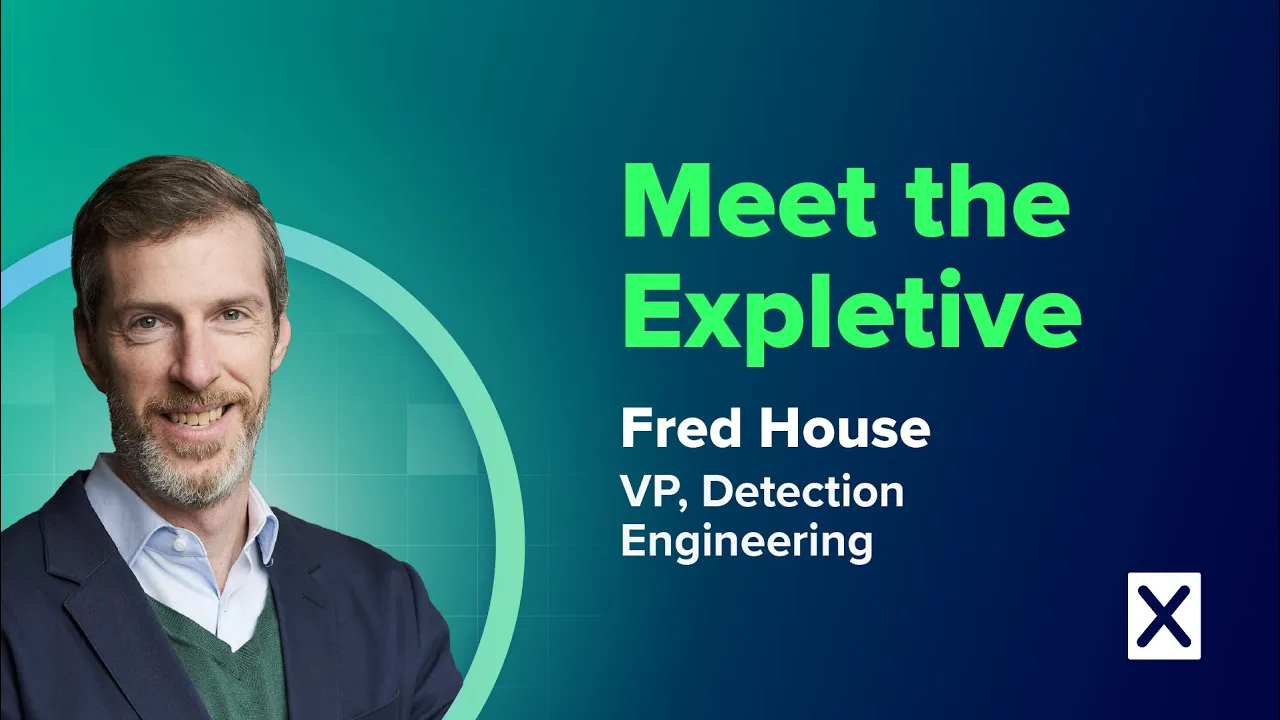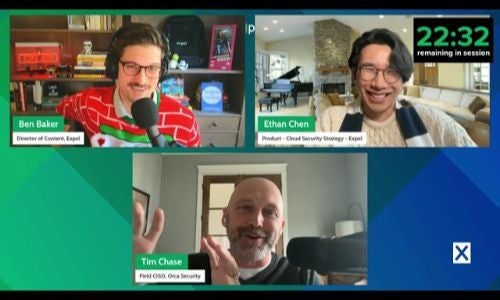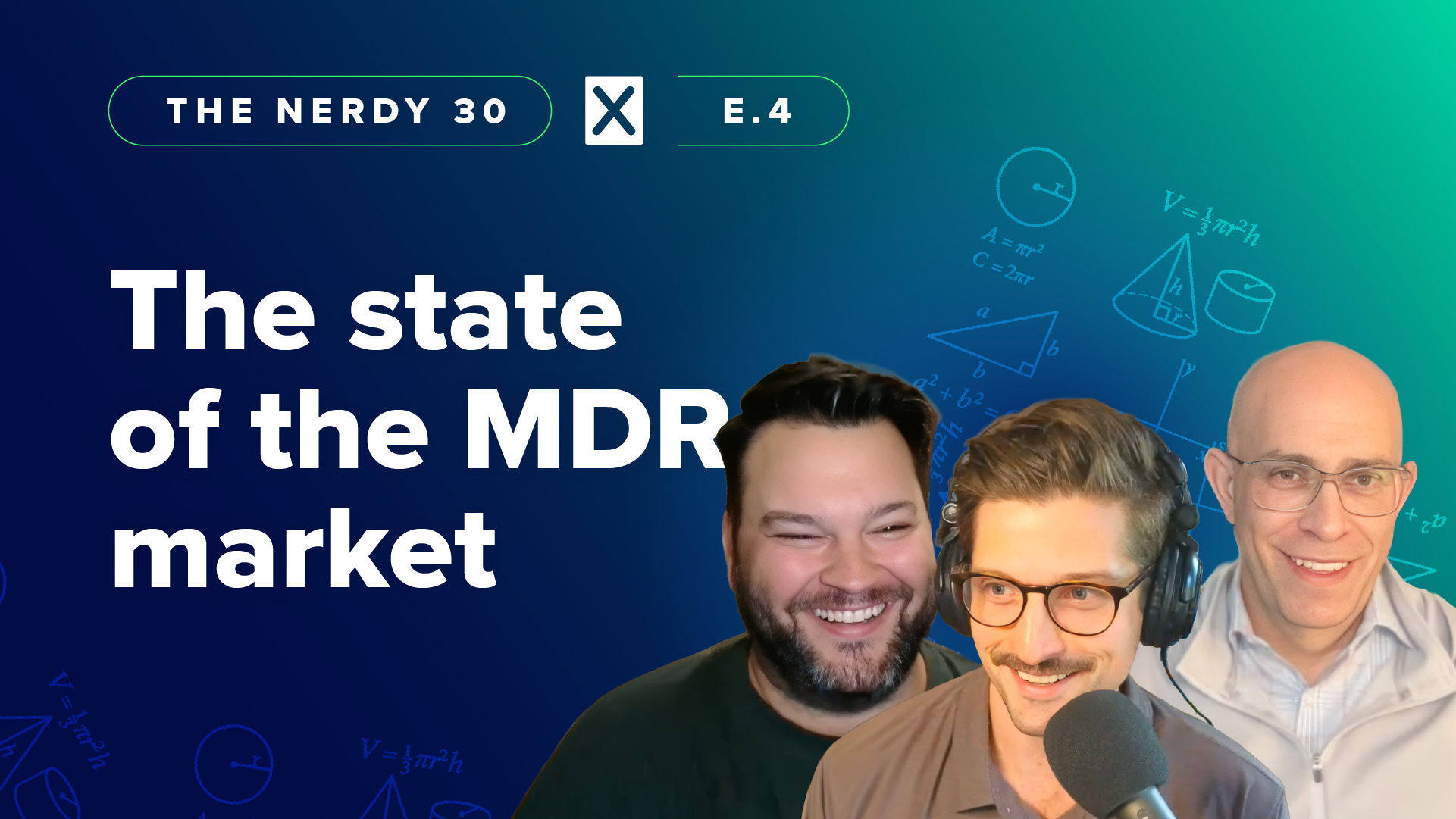Videos · Ben Baker
In this episode of “Meet the Expletives,” Ben Baker sits down with Expel’s Vice President of Detection Engineering and Innovation, Fred House. They discuss Fred’s career journey, what drew him to Expel, and the unique culture of feedback and self-improvement at the company.
Key topics include:
- Fred’s path from software engineering to cybersecurity
- The mission-driven culture that attracted Fred to Expel
- The importance of self-awareness and constructive feedback in leadership
- Fred’s time living abroad and his proficiency in multiple languages
Introduction
Ben Baker: All right. Today we have Fred House, the Vice President of Detection Engineering and Innovation here at Expel. I have a couple of questions for you, Fred, and then we’re going to round out the session with what we call a “very important question,” which is a wildcard I’m going to draw from this Expel mug. It’s full of fun, very important questions. Please introduce yourself and give us a brief overview of your career.
Fred House: Sure thing. My name is Fred, and I’m the Vice President of Detection Engineering and Innovation. I lead two functions at Expel. One is the detection engineering organization, which is responsible for figuring out how we’re going to ingest all of the signal we receive from various security products and data sources and, ultimately, what we’re going to put in front of the SOC to work on. The other is the data science function. The goal there is to increasingly apply data science to how we do the former.
I studied computer science and computer engineering at Virginia Tech and did software engineering for about the first decade of my career. I fell into cybersecurity around 2010 through circumstance, and I got my introduction on the offensive side, working in computer network operations. After a few years, I decided I wanted to learn the defensive side of cybersecurity, and someone suggested I check out a small company called Mandiant.
I joined Mandiant and worked in incident response there, which is ultimately how I ended up at Expel. For those who know, a lot of former Mandiant folks both founded Expel and were early employees. Anyway, I was at Mandiant for a couple of years. They got acquired by a company called FireEye, and with my engineering background, I gravitated towards the product side of the company. I stopped being an incident response consultant and started working on making the products better at detecting things, starting with endpoint and then expanding to a lot of the additional types of products that FireEye had. They were acquired through private equity, and I did that for a few years. Ultimately, through my previous connections with former Mandiant employees, I made my way to Expel.
Why Expel?
Ben Baker: I didn’t know you were a Hokey, that’s exciting. Are you a Virginia Tech athletics fan? I feel like every now and then they have a pretty good football team.
Fred House: There’s a tiny rubber chicken behind me with a Virginia Tech jersey on. That’s a story for another time, but yes, I’m an avid Virginia Tech fan. I used to go to Blacksburg very consistently, pre-COVID, for at least one football game a year. Virginia Tech played Rutgers the last two years here in New Jersey, where I live now, so that was a lot of fun. I got to see them locally, but yeah, I’m a big football fan.
Ben Baker: So, you’ve already alluded to this, but beyond who you knew here—obviously people are a huge part of working at a company—what drew you to Expel, and what’s your favorite part of working here?
Fred House: As soon as I started the interview process, it didn’t take long before I knew it was a good fit for me. The reason was because of the mission focus. My job on the offensive side was very mission-focused. When I joined Mandiant under Kevin Mandia’s leadership, that’s what it was all about. It was really about stopping bad guys. As my career evolved and Mandiant became FireEye, and FireEye became Trellix, I lost a little bit of the connection to the mission.
When I started interviewing with Expel, that mission focus was still very present. I think that’s partially because a lot of the people who founded Expel and the early adopters came from Mandiant. I would also add that you hear pretty much any leader in the cybersecurity industry talk about how it’s about the mission, but when some people talk about it, you believe it more than others. I think Kevin and the leadership team at Expel fall into that category. We’re in business to earn money, but we get up in the morning and do this because we’re fighting a good cause.
You also asked another question that I didn’t answer, which is my favorite part of working here. I would say the culture side of Expel. It’s very real. I underestimated it and didn’t appreciate it. Maybe it was because I worked in some places in the past that didn’t have a strong culture, and I didn’t know what great felt like. The culture is still very present at Expel and has survived its growth over the years, which makes it a very nice place to work.
The culture of feedback
Ben Baker: What’s something about Expel you don’t think a lot of people know, but maybe they should?
Fred House: Another thing that I didn’t appreciate until I got here was the commitment to self-improvement. I’m referring to, you know, if we take too long to build a widget, we go back and ask why that was and how we can improve. As my organization has tried to scale, we’ve moved fast and made good and bad decisions. I think it’s important to go back, revisit those, and improve. The cross-functional teamwork, like collaborating with product and engineering and my team, is done pretty well here.
I came in and really appreciated the way leadership talked about conflict. There should be conflict, and we have to escalate gracefully when there is. That self-awareness within the company and leadership is ultimately what makes it feel safe for people to take chances and work well together.
I’ll give another example. I probably went years in my career as a leader without getting critical, constructive feedback. That’s not because I was perfect; it’s because the places I worked didn’t have the self-awareness to do that. I’ve had several times since joining Expel where it’s like, “Fred, you could have handled this situation differently, or the way you addressed this could have been better.” I love it because I want to self-improve, and if I left a meeting and didn’t handle it well, please give me that feedback. I see that happen here, as well as the kudos when people do well. I love the real-time feedback and that people aren’t afraid to tell others what they did well and where they can improve. That’s really important and something that, based on my experiences, often does not happen.
Just for fun
Ben Baker: Alright, so we learned that you’re a Hokey. What else is something a lot of people don’t know about you? Do you have any hidden talents or anything like that?
Fred House: What folks usually don’t know about me is that I’ve lived overseas for a decent amount of time. I lived in Argentina for a year, and I lived in the United Arab Emirates for three years. I also speak Spanish at what I would call an advanced tourist level, and I speak French at an advanced tourist level, perhaps even higher than that.
Ben Baker: Very good. Was that the result of immersion, or are you hitting up Duolingo every day? What’s your go-to for learning new languages?
Fred House: Spanish was the result of me moving to Argentina and trying very hard not to be the guy who spoke to everyone in English. The preparation for going there, followed by living there for a year, is where I got my Spanish to a certain level. Unfortunately, or fortunately, I met a woman there who was French, and that changed my trajectory of learning Spanish very quickly. I’ve been married for a while now to my French spouse, and that would explain my semi-proficiency.
Ben Baker: That is a great answer, much better than Duolingo, I must say. We’re going to hop to our last question here, which is the true, very important question of the interview. If you could instantly transfer one skill from any fictional character to yourself, what would that skill be?
Fred House: I’m trying to do better than “I can fly” like Superman. I’ll give you mine to see if it stirs up your juices. Mine was the Force, so I would take the Force from Luke Skywalker. It’s kind of a lame one, too, but I just really want to be able to use the Force, if I’m being honest.
Bending other people to your will would certainly be nice. It would come in handy in both personal and work life. I’ll go with the ability to go invisible. Not in the sense that I want to hide from the world, but more in the sense that I could use it to achieve other motives and goals.
Ben Baker: I mean, honestly, being invisible would be cool, so no shame in that. That sounds good. Fred, I appreciate you hopping on with us.






